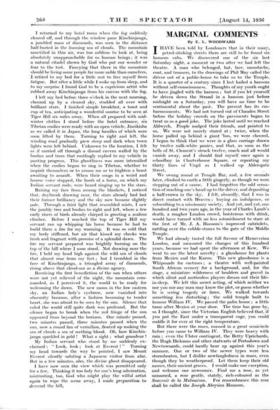MARGINAL COMMENTS
By E. L. WOODWARD
IHAVE 'been- told by Londoners that in their mazy, petrol-stinking streets there are still to be found six hansom cabs. We discovered one of the six last Saturday night, a moment or two after we had left the theatre. A man who belonged, hat, face, moustache, coat, and trousers, to -the drawings of Phil May called the driver out of a public-house, to take us. to the Temple. It is a quarter of a century since I last-hailed a hansom without.self-consciousness. Thoughts of my youth ought to have. jingled with the harness ; but if you let yourself -be driven down the Strand in a hansom just -before -midnight on a Saturday, you will have no time to be sentimental about the past. The present has its em- barrassments. We had not turned out of Chandos Street before the holiday crowds on the pavements began to treat us as a good joke. The joke lasted until we reached Aldwych. People nudged their friends, and pointed to us. We were not merely stared at ; twice, when the horse pulled up behind_ a giant 'bus, we were cheered. J began to think that we were in a glass carriage drawn by twelve milk-white ponies, and that, as soon as the bells of St. Clement's struck twelve, coach and all would vanish away, and I should find myself once 'again a schoolboy in Charterhouse Square, or repeating my thirty lines of Virgil as I walked up Aldersgate Street.
We swung round at Temple Bar, and, a few seconds later, climbed to earth a little gingerly, as though we were stepping out of a canoe. I had forgotten the odd sensa- tion of reaching one's hand up to the driver, and depositing a half-crown in the sky. I felt, absurdly, that I was in direct contact with Heaven ; buying an indulgence, or subscribing to a missionary society. And yet, and yet, one hundred and two years ago, in-the year of Charles Lamb'S death, a rougher London crowd, boisterous with drink, would have turned with no less astonishment to stare at the first of Mr. J. A. Hansom's improved cabriolets, rattling over the cobble-stones to the gate of the Middle Temple.
. We had already tasted the full flavour of Hanoverian London, and _measured the changes of this hundred years; because we had spent the afternoon at Kew: _We went to see the latest novelty ; a glasshouse for plants from Mexico and the Karoo. This new 'glasshouse is a Whipsnade for cactuses ; a theatre with well-painted South African scenery for a background,' and, for the stage, a miniature .wilderness of boulders and gravel in which silent and motionless players dream Out their life-. in-sleep. We left this secret acting, of which neither we nor you nor any man may know the plot, or guess whether he is seeing tragedy or farce. We walked towards something less . disturbing ; the solid temple built to honour William IV. We passed the palm house ; .a little tame after Mexico at your door. The time has gone by, so I thoUght, since the Victorian English believed that, if you put the East under a transparent cage, you could coddle it for ever at the right temperature.
But there were the roses, massed in a great semicircle before you came to William IV. They were heavy with rain ; even the Ulster contingent, the Betty Uprichards, the Hugh Dicksons and other stalwarts of Portadown and Newtownards, could hardly bear up against this- year's summer. One or two of the' newer types were less stormbeaten, but I dislike newfangledness in roses, even though they be weatherproof. Let them keep their old names, their ancient graces. I would make one exception, and welcome one newcomer. Find me a rose, as yet unnamed, a rose gentle, stately, rich-coloured as the Souvenir de la Malmaison. For remembrance this rose shall be called .the Joseph Aloysius Hansom. •






































 Previous page
Previous page